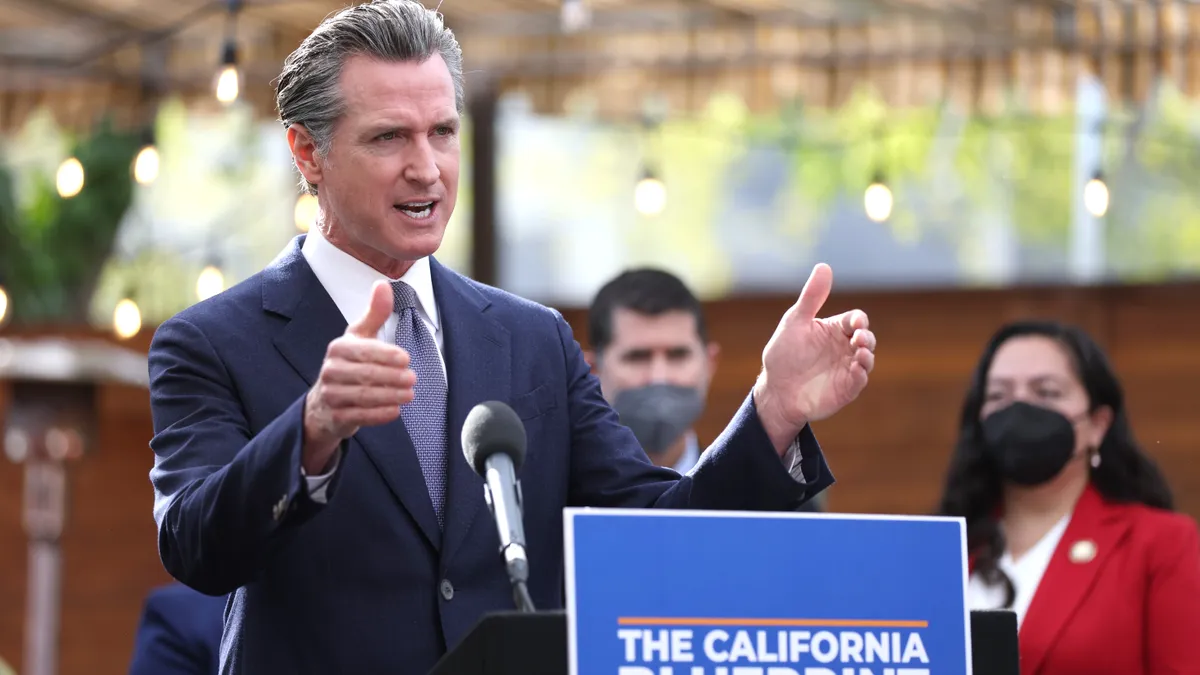Dive Brief:
- California Gov. Gavin Newsom signed the amended AB 1228 labor compromise into law Thursday, formally ending the political struggle between the restaurant industry and organized labor over the creation of a fast food wages and standards council.
- Under the law signed by Newsom, the minimum wage at fast food restaurants that are part of brands which have 60 or more units nationwide will rise to $20 an hour on April 1, 2024, and the council created by AB 1228 will have limited power to set the pace of wage increases until 2029.
- The signing of the law prevents the original fast food council law, AB 257, or the Fast Recovery Act, from going to a referendum. This ends the chance of California passing a joint-employer law in the near future and ensures Newsom will not turn a renewed Industrial Welfare Commission on the fast food industry.
Dive Insight:
Newsom’s administration likely pushed the restaurant industry and organized labor to the bargaining table with the threatened revival of the IWC. The commission gave the state broad authority to regulate pay and working conditions in high-poverty industries, which would have left the restaurant industry exposed to significant regulatory scrutiny even if AB 257 was defeated in November 2024.
“The IWC meant that there was a there was an apparatus that was in place that didn't need legislative approval, it could only be removed with an amendment to the Constitution,” Sean Kennedy, EVP of Public affairs for the National Restaurant Association, said.
“There are significant challenges created by this law that restaurants will have to navigate, but they will do it with stable and predictable regulation that they wouldn’t have had under the FAST Act or IWC,” Kennedy said in a statement. “[IWC] basically could do 90% of what the FAST Act could have done.”
The deal replaced the proposed AB 257 council, which was a regulatory body with wider latitude to set rules impacting industrial conditions, with a weakened advisory council, Kennedy said.
“Under this legislative agreement, there are lots of issues that [the council] can examine, And they can make recommendations to government bodies, but they don’t have the force of law,” Kennedy said.
Matt Haller, CEO of the International Franchise Association, said the deal “preserves the franchise business model in the state.”
Service Employees International Union President Mary Kay Henry also praised the governor’s signature and said the deal followed “a decade of strikes, organizing and militant action in the streets.”
SEIU characterized the deal as historic, and set in the context of renewed labor militancy across industries. The past nine months has been major for confrontation between organized labor and major employers.
Following the victories of dissident factions in internal election in the Teamsters and United Auto Workers, both unions prepared to strike at major employers. The Teamsters ultimately agreed to a contract with UPS, averting a strike in late August. The UAW is still on strike at Ford, General Motors and Stellantis. UNITE HERE, a service workers union in restaurants and hotels, struck in Los Angeles earlier this year and members recently authorized a potential citywide strike in Las Vegas’ hospitality industry. The Screen Actors Guild and Writers Guild of America both struck against the Alliance of Motion Picture and Television Producers, with WGA reaching a tentative deal after 146 days and SAG due to resume negotiations next week.













